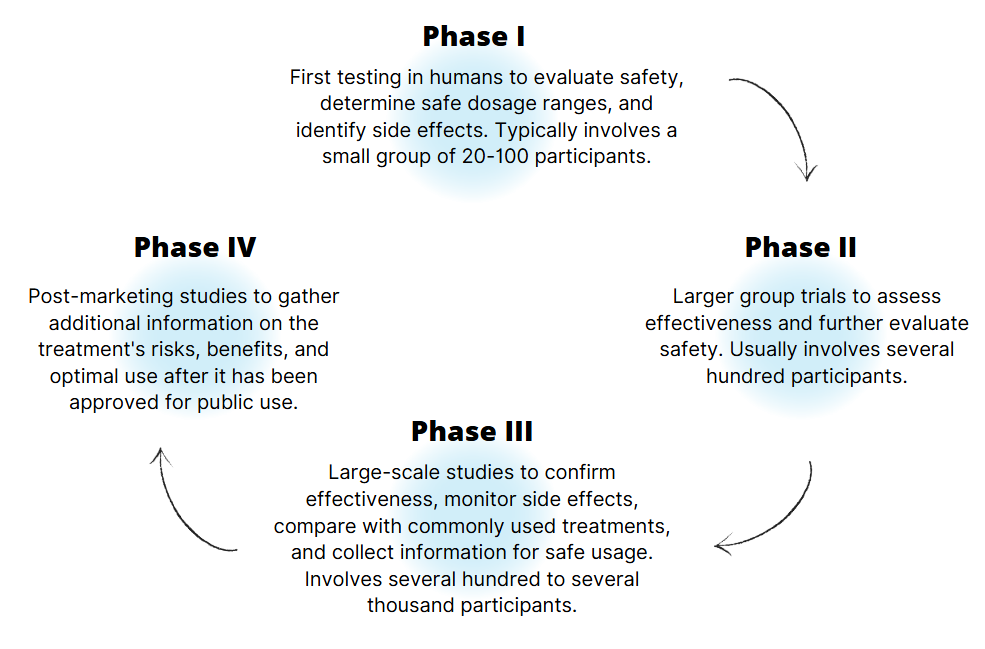Participating in clinical trials offers a unique opportunity to contribute to the advancement of medicine, gain access to cutting-edge treatments, and earn substantial compensation. At Haltha, we make it our mission to connect you with the highest-paid clinical trials, ensuring that you find opportunities that align with your goals and priorities.
Understanding Clinical Trials and How Much They Pay
Participating in clinical studies not only advances medicine but also offers a possibility for significant financial pay-off. Volunteering enables people to assist researchers in developing novel medicines and enhancing current ones, therefore enabling the advancement of healthcare. The definition of research studies that pay near me, the many stages involved, and the possible payback for participants’ participation are discussed in this article.
What are Clinical Trials?
Clinical trials are investigations carried out to assess the safety, efficacy, and possible adverse effects of newly developed medications, therapies, or technology in relation to Advancement in medical knowledge and enhancement of patient care depend on these investigations. Clinical trial participants enable researchers to ascertain if a new therapy is effective, how well it performs relative to current therapies, and any possible side effects. Through their participation in clinical trials, people help to greatly progress medicine and create novel treatments.

How Much Do Clinical Trials Pay?
Factors like the duration, complexity, and degree of risk involved in a clinical study will greatly affect the pay for taking part in one. For brief, low-risk studies, payments may be as little as $50. For longer, more complicated trials with greater risk, payments might be over $10,000. Knowing the many stages of clinical studies may assist volunteers in estimating possible income.
| Trial Phase | Description | Payment Range |
| Phase I | Safety and dose assessment among a small sample of subjects | $1,000 – $10,000+ |
| Phase II | Larger group effectiveness and side effect evaluation | $500 – $5,000 |
| Phase III | Large-scale studies verifying efficacy and contrasting with conventional therapies | $1,000 – $5,000 |
| Phase IV | Studies conducted aftermarket for more details on hazards and advantages | $50 – $1,000 |
Understanding the kind and extent of various clinical trial stages helps participants to decide which studies to participate in, therefore balancing financial remuneration with personal risk and commitment.
Types of High-Paying Clinical Trials
While helping to fund important medical research, high-paying clinical studies provide participants the possibility to make significant revenue. The kind of research and related hazards affect the pay for these studies. Drug trials, behavioral studies, and medical device trials are among the many kinds of clinical trials here that can provide better compensation.
Drug Trials
Usually involving new drugs to assess their safety, effectiveness, and adverse effects, drug trials may pay more as the possible hazards of new medications entering the human body call for more compensation. Drug trial participants not only get paid clinical trials but also get access to innovative medicines with great medical value. Still, before engaging, one should weigh the possible negative effects and health hazards.
Behavioral Trials
Behavioral studies focus on psychological and behavioral interventions, that is, novel treatments for mental health disorders or lifestyle modifications. Usually posing less physical danger than medication trials, these investigations result in somewhat smaller compensation. Still, they are vital for expanding our knowledge of mental health and behavior and provide participants the chance to help with relevant research free from many health issues.
Medical Device Trials
Medical device trials examine the safety and efficacy of recently developed medical tools or instruments such as implants, diagnostic tools, or treatment instruments. Sometimes, including surgical operations or other treatments, these tests usually call for individuals to utilize or engage with the gadget under research. The complexity and risk associated with medical device studies will affect their compensation somewhat greatly. By helping to bring creative medical solutions to market, participants in these studies could allow many people’s healthcare outcomes to be improved.
Best Ways to Find Highest Paid Clinical Trials Near Me
Locating high-paying clinical studies in your neighborhood might be a fantastic approach to making additional money and supporting significant medical research. There are various trustworthy ways to find these prospects, so you may take part in tests that meet your requirements and calendar.
Clinical Trial on Haltha website
Haltha is a complete tool with listings of many clinical studies, including ones paying more. Regularly visiting our website will help you to remain informed on the most recent prospects and apply for trials that fit your qualifications.
Local Research Hospitals
Directly contacting local research institutions and universities is one of the best strategies for locating clinical trials for money. These organizations may be gathering subjects for high-paying studies and usually have active research initiatives.
Here is how to get going:
- Identify local research institutions. Search your location for hospitals, research facilities, and medical schools.
- Contact the research department. Find out about current research by contacting the clinical trials office or research department.
- Ask about compensation. Ask about the pay scale for every trial without thinking twice.
Following these guidelines will help you to find rich clinical studies in your vicinity and be in good shape. To enhance your chances, don’t hesitate to get in touch with many institutions. Developing rapport with the research coordinators also gives you inside knowledge about forthcoming projects.
When Do You Get Paid for Clinical Trials?
The particular study will determine the clinical trial payment schedule. While some trials could pay a single amount at the conclusion, others might give money in installments throughout the course of the research.
When do you get paid for clinical trials? Generally speaking, you will be paid after certain research events or benchmarks. You may get compensated, for instance, for each visit, blood draw, or surgery.
Reviewing the informed consent form closely helps one to grasp the payment terms and circumstances for every experiment.
Research Studies That Pay Near Me: How to Apply
Applying for research projects with great pay might be competitive, but with the correct strategy, you increase your chances of getting approved. Here are some pointers to make you stand out and get a seat in trials, earning more.
- Keep a comprehensive medical history
Having thorough medical history documents can help you appeal more to clinical trial researchers. Make sure your records are easily accessible and current.
- Gain previous participation experience
Previous participation in clinical trials will show your dependability and eagerness to follow research guidelines. Often, prior performance makes you a favored choice for future ones.
- Maintain good health
Strict health requirements abound in many studies. Keeping a good lifestyle will increase your eligibility for a larger spectrum of research.
- Stay informed and apply early
High-paying clinical trials can fill up quickly. Regularly visit the websites of research hospitals and routinely check Haltha for the latest trial opportunities. By applying as soon as a new trial is published, you increase your chances of being selected.
- Join participant databases
Enroll in participant databases and sign up for email alerts on Haltha. This proactive approach ensures you receive immediate notifications about new clinical trials, giving you a head start in the application process.
- Tailor your application
Each clinical trial may have specific participant requirements. Customize your application to highlight how you meet these criteria. Be honest about your medical history and any relevant experience to enhance your suitability for the trial.
Following these guidelines and aggressively looking for possibilities can increase your chances of getting approved for nearby higher-paying clinical studies.
High Paying Research Studies Near Me: What to Consider Before Applying
Although taking part in clinical studies may be very profitable, one should approach them carefully and take into account the following elements:
- Safety considerations
- Potential risks. Appreciate the possible hazards and adverse effects connected to the experiment;
- Emergency procedures. Make sure that any negative incidents may be handled by means of emergency protocols.
- Informed consent
- Clear communication. Make sure you grasp every element of the trial, including the protocols, possible hazards, and rewards;
- Question asking. Ask inquiries about anything you find unclear without delay;
- Right to withdraw. Recall your right to withdraw from the trial at any moment without facing consequences.
- Tax implications
- Consult a tax professional. See a tax advisor to find out how your clinical trial income could be taxed;
- Report income. Get ready to claim your clinical trial income on your tax return;
- Potential tax deductions. Sometimes, you could be qualified for tax deductions for medical costs paid during the trial.
Carefully weighing these elements will help you decide whether to take part in clinical studies and maximize the possible advantages while lowering the hazards.
FAQs: Highest Paid Clinical Trials
How Do I Find the Best Clinical Trials Near Me?
Start your search for the top high paying research studies near me by looking online at websites of research hospitals, Haltha, and clinical trial registrants. Getting in touch with local colleges or medical facilities might also provide details about current research. Combining participant databases will also enable you to remain updated on fresh trials that fit your qualifications and interests.
Are Clinical Trials Safe?
Following rigorous ethical standards and legal requirements, clinical studies are set with participant safety as the first concern. Risks exist, nevertheless, particularly in early-phase studies evaluating novel therapies. Before opting to take part, one must carefully review the informed consent forms, probe questions, and see medical experts.
What Factors Affect How Much You Can Get Paid in a Clinical Trial?
The pay for clinical studies is determined by many elements:
- Trial phase. Later-phase studies can provide more pay;
- Trial length. Trials lasting longer might pay more overall;
- Level of risk. Higher-risk trials might pay more than others;
- Specific requirements. Special needs like regular checkups or operations could affect the cost.
Can I Participate in Multiple Clinical Trials at Once?
Usually discouraged is participation in many clinical trials concurrently, as it can cause difficulties or compromise the outcomes of the research. Usually, each trial calls for exclusiveness to guarantee the integrity of the study. Before applying, to prevent any conflicts, always check the rules of every trial and contact the research coordinators.
Are There Clinical Trials Just for Women?
Yes, there are clinical studies, especially for women, that concentrate on health problems mostly affecting female populations, including menopause, breast cancer, and reproductive health. These studies could aim at certain physiological features or gender-specific disorders. Women who want to take part in such research should search certain databases or get in touch with medical professionals for more information about open prospects.
Final Considerations for Clinical Trials for Money
For people wishing to make additional money and support medical research, taking part in clinical trials might be a tempting choice. Still, one should consider the advantages and disadvantages before deciding what to do. The main benefits and drawbacks of joining clinical studies are shown below.
| Pros | Cons |
|
|
Considering these advantages and drawbacks, careful thought will enable you to decide whether or not to take part in money-driven clinical studies. Always give your health and well-being first priority. If you have any questions before enrollment, see medical experts.




